|
|
1067 matching reports found. Showing 21 - 40 [TamilNet, Monday, 18 February 2013, 23:53 GMT]Criticizing the Burmese government and Buddhist extremists in Burma for the pathetic conditions of camps for Internally Displaced Persons belonging to the Rohingya and Kachin ethnic communities, the UN Special Rapporteur to Burma Mr. Tomas Ojea Quintana, addressing a press conference on Saturday, compared the refugee camps to prisons, Burmese media reported. The camps are located in the Rakhine state of Burma which house over a 100000 Rohingya IDPs, who were displaced in last year’s ethnic violence, and in the Kachin state in North Burma, where Kachin rebels have been fighting for regional autonomy. Peace talks between the Kachin rebels and Burma have been on since early this February. The current Burmese government ruled by President Thein Sein, a former military commander, is considered by some analysts to be a moderate, pro-reform and pro-US regime. Full story >> [TamilNet, Saturday, 16 February 2013, 11:06 GMT] A permanent Sinhala colony is in the making at Naavat-kuzhi in Jaffna with the assistance and backing of the genocidal government in Colombo and with the protection of its occupying Sinhala military in Jaffna. Buddhist associations in the south and EPDP collaborating with the Rajapaksa regime are also involved in the process, news sources in Jaffna said. Naavat-kuzhi is a major junction located 5km east of Jaffna city, where the two highways A9 and A32 that come from the south join and enter into the city. To give protection to the colony, a Sinhala military camp is also established there amidst the colonisers. The Sinhala colony at the location is planned to control the arteries of the city and to even Sinhalicise Jaffna city itself, as similar tactics were tested earlier at Trincomalee, the sources further said. Full story >> [TamilNet, Monday, 11 February 2013, 23:08 GMT]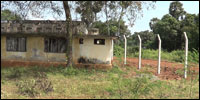 In a sudden and swift move, Sri Lanka military occupying Jaffna has started demolishing hundreds of houses of Eezham Tamils in the stretch of land at Valikaamam that was occupied by the Sinhala military in the guise of ‘High Security Zone (HSZ)’ two decades back. The war is over, proclaims everyone, including the USA and India. The Tamil public righteously expected the return of their houses and ancestral properties if the war was over. There was propaganda that resettlement takes place stage by stage in the HSZ, which was also endorsed by all the Establishments in complicity. Then how, why, and with what authority vested with whom, the decision has been now taken to raze down the ancestral houses of Eezham Tamils in the so-called HSZ, ask the concerned people up-rooted for more than two decades and finally lost everything to the designs of the genocidal partners. Full story >> [TamilNet, Wednesday, 23 January 2013, 06:36 GMT]The Eighth meeting of the Indo-Sri Lanka Joint Commission held in New Delhi on Tuesday and was co-chaired by the External Affairs Ministers of the two Establishments, ended with nothing new either to the pressing issues of the genocide-facing island or to its bilateral issues with India, political analysts in the island commented. A Foreign Secretary level meeting on Monday preceded the ministerial meeting. Perhaps the only new programme found mentioned in the joint commission press statement was that both sides agreed to jointly celebrate the 150th birth anniversaries of Swami Vivekananda in 2013-14, and of Anagarika Dharmapala in 2014-15. Full story >> [TamilNet, Saturday, 12 January 2013, 23:55 GMT]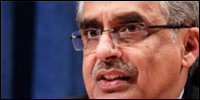 While the International Community which, blinded by the 9/11 terror, architected the annihilation of Tamils' primary safeguard, the LTTE, is left to savor the resulting horror state and the autocratic dystopia in Sri Lanka, Rights groups have accused the U.N. of being derelict in its duty to protect civilian lives. Vijay Nambiar, the Chef de Cabinet, who was a key official in shaping UN's Sri Lanka policy, is also accused of complicity in the "Whiteflag" incident where several surrendees were executed by the Sri Lanka military after being given assurances of safety by International actors. Nepotism and family connections between Ban Ki Moon and Nambiar, with personal links to India and Colombo, may also have contributed to the U.N.'s unwillingness to stop the Mu'l'livaaykkaal massacre, observers say. Full story >> [TamilNet, Thursday, 03 January 2013, 08:14 GMT]While various publications, including an internal investigation report of the UN, find fault with the way the UN handled the Vanni War that ended in genocide, the UN, the ICRC, the IOM and other international agencies continue to commit the same blunder knowingly, by leaving Eezham Tamils entirely in the hands of Colombo, with no outfits to complain with trust or to independently monitor the on-going genocide, said a senior social activist in the island, citing the cases of the repeated rape and abuse of former LTTE cadres, the sufferings of the Tamil women coerced into SL military, the plight of a doctor who voiced for them, forced relocation of re-settlers and the acts committed on Jaffna University students. These take place at individual level, apart from the larger militarisation, colonisation and Sinhalicisation of the genocidal agenda, he said. Full story >> [TamilNet, Friday, 28 December 2012, 00:15 GMT]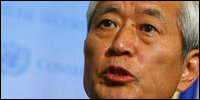 Yukio Takasu, the 2009 President of the UN Security Council (UNSC) on the critical month of February, was one of the key UN officials who allegedly prevented Sri Lanka from being dragged into the UNSC for the unfolding mass scale killings in Mu'l'livaaykkaal, public statements made by UN officials during media stakes reveal. While some UN Security Council (UNSC) permanent members may have agreed with Takasu'a views, in a media stake out, Takasu lays out his "own" critical view of the "terrorist LTTE," and the primacy of political and security need to "defeat" the Tigers over imminent large scale civilian casualties. Political observers believe that Japanese cultural views on refugees, asylum seekers may provide clues to Takasu's approach and conduct in the UNSC that led to the disastrous outcome for the Tamil refugees trapped in Sri Lanka's civil war. Full story >> [TamilNet, Sunday, 23 December 2012, 18:46 GMT]In a report on the international protection needs of asylum seekers from Sri Lanka, UNHCR identifies several risk profiles including persons suspected of links with the Liberation Tigers of Tamil Eelam (LTTE), journalists, human rights activists, witnesses to rights violations, and vulnerable children and women, and notes while "there is an ethnic dimension to their vulnerability," in each of these risk groups, "members of the minority Tamil and, to a lesser extent, Muslim communities are reportedly more often subjected to arbitrary detention, abductions or enforced disappearances." Tamil activists including the New Zealand Tamil Action Front was consistently canvassing for this and there was a response in this regard from the Australian representative of the UNHCR in a regional meeting held at Auckland on 19 November. Full story >> [TamilNet, Wednesday, 19 December 2012, 02:16 GMT] Public statements made by UN officials during media stakeouts and briefings, Wikileaks exposures, and the testimony of twelve UN field staff reported earlier in TamilNet provide a blue-print to the strategy adopted by the UN to allow Sri Lanka to defeat the Tigers, and to ignore the mounting numbers of civilian casualties. This feature catalogues the statements from UN's former humanitarian chief, John Holmes, as he attempts to provide diplomatic cover to the slaughter taking place in Mu'l'livaaykkaal, repeatedly relying on Colombo's assurances on not using heavy weapons, and hesitating to provide casualty figures, a conduct comport with the "internal" strategy revealed by the then President of the United Nations Security Council, Yukio Takasu, that gave primacy to the need to eliminate the “terrorist LTTE …which had broken several ceasefire agreements." Full story >> [TamilNet, Friday, 02 November 2012, 01:39 GMT] “Today there is a psychological and political warfare waged against the Tamil Diaspora not only to forget the past but also to abhor the whole project of a Tamil state. Domination under the Sinhala dominated unitary state has been justified as a rational and realistic choice,” Sinhala academic Dr. Jude Lal Fernando said at a conference held in Lecce, Italy last Friday. Criticizing the West for tilting the parity of status against the LTTE, he added that “what has been committed is genocide with full international endorsement. It is approved simply to protect the unitary state of the Sinhalese.” The conference titled “We demand our land” was also addressed by TNPF leaders Gajendrakumar Ponnambalam and S. Kajendran, besides Italian EU politician Adriana Poli Bortone, and human rights activist Klodiana Cuka and lawyer Italo Porcaro. Full story >> [TamilNet, Monday, 08 October 2012, 23:29 GMT] Many UN teams are visiting the island of Sri Lanka in connection with the reviews of UNHRC in November 2012 and March 2013. The civil society in Jaffna is concerned that the UN team visits are encouraged to serve the agenda of the Colombo government, said civil society activist and Jaffna University academic in law, Mr Guruparan Kumaravadivel to media in Jaffna on Monday. The visits are not transparent, as they have not revealed the Terms of Reference and restrictions to their visits, and most of the time, they end up visiting SL government officials and people who do not come up with independent views. The whole exercise raises questions on UN deliberations in the island and “the UN definitely has not learnt lessons,” Mr Guruparan further said. Full story >> [TamilNet, Saturday, 29 September 2012, 22:47 GMT] Following persistent Distributed Denial-of-Service (DDoS) attacks on TamilNet in late February that coincided with the UN Human Rights Council sessions in Geneva, the site was once again intensively attacked this week by sources originating from various countries. Most of the co-ordinated attacks on 26 September originated from India, Malaysia, Israel and Germany. The attacks have also come from Thailand, Georgia, Brazil and Pakistan. This time, the cyber attacks on TamilNet coincided with its exclusive coverage exposing resettlement farce in Vanni, while Colombo and its abettors in the International Community of Establishments and in the international organisations, were projecting the closure of the IDP camp in Vavuniyaa as marking the successful completion of resettlement, ostensibly for the bailout of Colombo and continuation of the deceptive LLRC roadmap. Full story >> [TamilNet, Thursday, 27 September 2012, 00:04 GMT]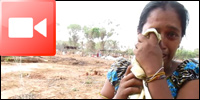 No one from the UN or any other international humanitarian body had come to witness the plight of the people who were forcefully relocated from IDP camp to Vattaappazhai in Mullaiththeeu and then dumped at a plot of land cleared after burning jungle at Chooripuram. The people belonging to more than 110 families languish without potable water or any basic facilities. Many of the remaining families have also been dumped at similar sites at Kaiveali and in other pockets of Puthukkuidyiruppu division. TamilNet brings out photos of Kaiveali and Chooripuram and a video clip from Chooripuram. The visuals tell the story, while the UN and IOM, who have not taken any effort to visit the site, pat their own backs and that of Colombo on fulfilling the ‘commitment’ and resettling people back in their ‘homes’ with safety and dignity. Full story >> [TamilNet, Tuesday, 25 September 2012, 19:16 GMT]While the Eezham Tamil survivors of the genocidal war, herded into barbed-wire camps three years ago, are now dumped against their wishes into shelters and jungle tracts forced onto them after their fertile lands and homes are grabbed by the occupying military, the United Nations and the International Organization for Migration (IOM) entered into a deceptive campaign in favour of the genocidal state on Tuesday that all the IDPs have now returned to their ‘homes’. "These families wanted to go home and IOM, in partnership with the UN and the humanitarian community, has helped them to do so in safety and dignity,” the IOM was cited saying on the closure of the last IDP camp, while the UN welcomed it as a “significant sign of the transition from conflict to sustainable peace” and fulfilment of the “commitment of the Government to resettling tens of thousands of people back to their homes.” Full story >> [TamilNet, Monday, 24 September 2012, 10:33 GMT]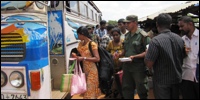 The SL military on Sunday dismantled the Cheddiku’lam IDP camp to forcefully remove the inmates, without making any permanent arrangement for their resettlement or return to their original villages. The seriously affected group is the villagers of Keappaa-pulavu of Mullaiththeevu district, whose village is now grabbed by the occupying military. The Sinhala military is quick to announce on Sunday, “There will be no more IDPs in the country from today.” On Friday, the camp inmates, having lost all confidence in Colombo government, have directly appealed for International intervention to enable them to return to their homes. The IC that abetted the genocide and herded the survivors into barbed-wire camps, now engineering even resettlement in continued complicity with genocidal Colombo, has again gone on record, commented Tamil political activists. Full story >> [TamilNet, Monday, 24 September 2012, 00:44 GMT] A report filed by an independent researcher based on eye-witness accounts from twelve United Nations humanitarian workers during the last phases of war ending in May 2009 on the policies implemented by Colombo, leading to starvation, deprivation of medical supplies, indiscriminate bombings of hospitals and schools in violation of UN Security Council resolution 1612 amounting to war-crimes and crimes against humanity, accuses the United Nation's officials' inaction, failure to speak out and willingness to acquiesce with the Rajapakse government's rights violations and state sanctioned killings of tens of thousands of unarmed civilians. Professor Boyle commented that Tamils should push for a UN independent commission similar to that which produced the hardhitting UN Rwanda report, and to avoid Srebrenica type report which was an inside UN job and hence was a coverup. Full story >> [TamilNet, Saturday, 22 September 2012, 19:33 GMT]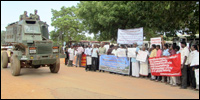 Following Friday’s demonstration at Mullaiththeevu for resettlement of the people of Keappaa-pulavu back in their own village, the SL military on Saturday embarked upon threatening the villagers now in the IDP camp at Cheddiku’lam to immediately vacate it, move temporarily to a school building at Vattaappazhai and accept the SL government offer of another place for resettlement. When the people insisted that they want their village and cultivation lands back, the Sinhala military commander started shouting in his language that either willing or not, all people would be removed from the camp before Monday. Speaking to TamilNet on Saturday, the TNPF leader Gajendrakumar Ponnambalam blamed the International Community for the current plight of Eezham Tamils. Full story >> [TamilNet, Tuesday, 07 August 2012, 19:41 GMT] While the international system bails out genocidal Sri Lanka by indecisiveness on international investigations, the occupying Sinhala military is engaged in erasing all remaining traces as well as in earning money by systematically backing plunder and trade of vehicles and scrap-iron left in the land of genocide. While citing land mines the public and local people are not allowed to return to Mu’l’livaaykkaal and Maaththa’lan, large gangs of Muslim traders brought from the South, and equipped with oxygen cylinder cutting tools, are openly engaged in removing vehicle parts and scrap iron. The SL military and some high officials earn huge amount of money in the lucrative trade. Meanwhile, 21 local families of Mu’l’livaaykkaal, who were recently allowed to come back in a showcase resettlement, languish without even drinking water and they are treated like slaves by the occupying military. Full story >> [TamilNet, Monday, 04 June 2012, 10:56 GMT]The evaluation report of Norway on its failed peace facilitation in the island of Sri Lanka had many points of criticism on wrong application of ‘development’ to the context. But Norway’s stubbornness in applying ‘development’ as a tool to make national liberation movements abide by genocidal and agent States created by the colonial order, and in turn to make them abide by the currently imagined order of the so-called international community, continue not only in the island of Sri Lanka but also in Burma. According to critics cited by Democratic Voice of Burma, the latest Norwegian initiative in Burma is being presented as “bait” for ethnic groups to join the government under its 2008 constitution. Having similar experiences before and after the genocidal war, the Eezham Tamils should not make any more mistakes, commented a political observer in Jaffna. Full story >> [TamilNet, Monday, 30 April 2012, 08:24 GMT] Utilizing various mediums, including drama, dances, spoken word, songs, and dialogue, second generation Tamil youth in Canada conveyed the message of preserving the Eezham Tamil identity, and continuing the freedom struggle of the Eezham Tamils, at I'lantha'lir - The Artistic Revolution of Tamil Eelam’. The event performed to a packed audience on Friday at The Chinese Cultural Centre in Toronto showcased the historical evolution of the Tamil Eelam Struggle. “An outstanding play with such amazing concept, acting, dances, songs, spoken word, screenplay, dialogue, setting and flow. Our struggles, our nation building capacity, our resilience, our cries, our milestones and our vision were communicated most effectively,” said Neethan Shan, President of the New Democratic Party of Ontario and the Guest of Honor at the event. Full story >>
|
|




















